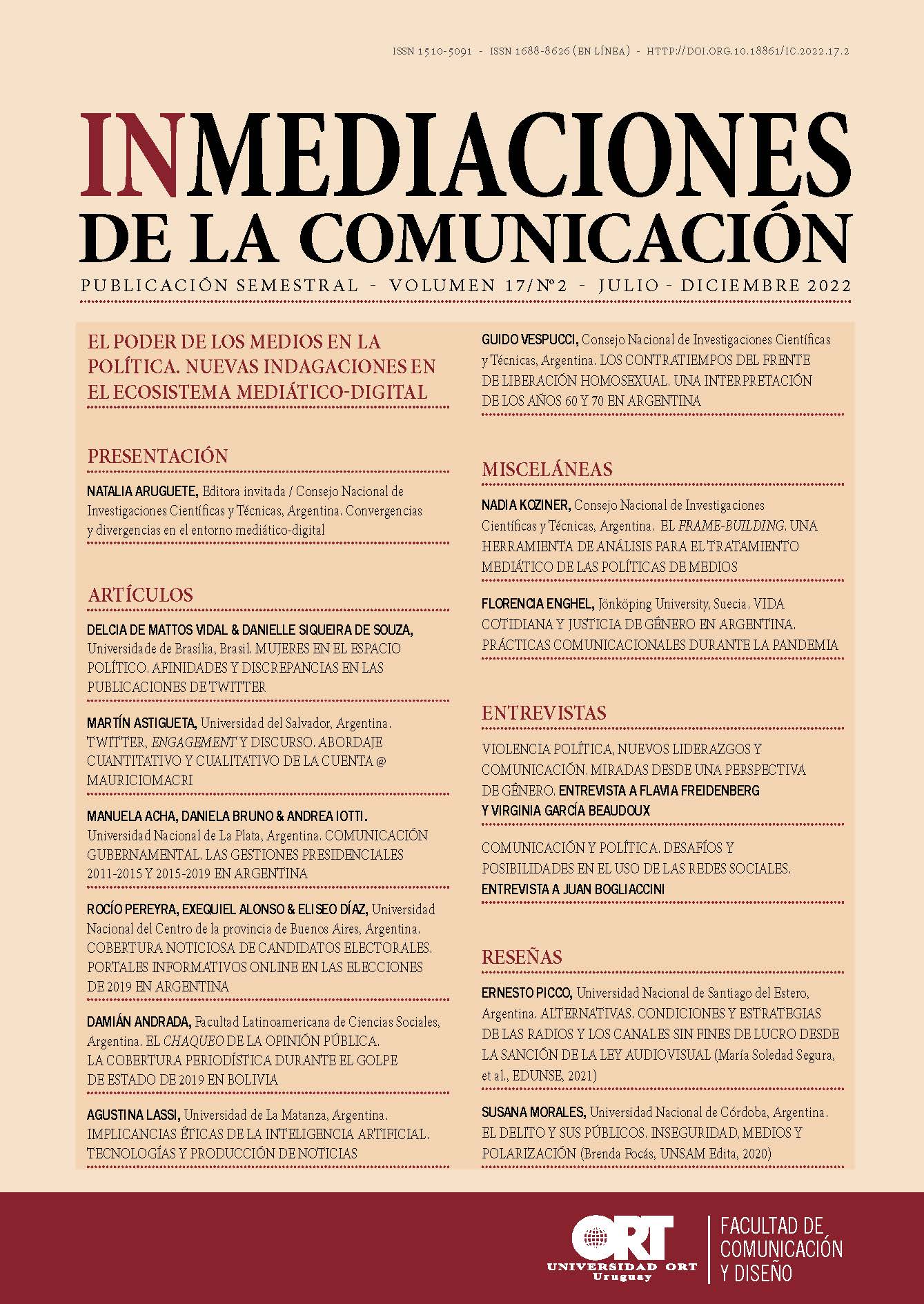Implicancias éticas de la inteligencia artificial
Tecnologías y producción de noticias
DOI:
https://doi.org/10.18861/ic.2022.17.2.3334Palabras clave:
inteligencia artificial, periodismo, redacciones, éticaResumen
Este artículo realiza un abordaje bibliográfico acerca de los desafíos éticos que supone la aplicación de la inteligencia artificial (IA) en el ámbito de las redacciones periodísticas. Para ello, se revisa el reporte sobre la automatización de noticias de la World Association of News Publishers –que representa a más de 120 países y es conocida como WAN-IFRA– y la guía vinculada al procesamiento algorítmico de datos en redacciones, publicada por la agencia de noticias The Associated Press (AP), cuya particularidad reside en la asistencia para la redacción de varias IA, además de ser pionera en la aplicación de estos sistemas a la producción de contenidos. Se identifican los principales dilemas éticos y se abordan los desafíos y las dificultades con que se enfrenta el periodista a la hora de utilizar el procesamiento maquínico para la elaboración, procesamiento y distribución de productos noticiables. La principal hipótesis de trabajo es que no existen aún documentos que consideren las potencialidades y las consecuencias de la aplicación de estas tecnologías de manera responsable y de acuerdo con las normas deontológicas del periodismo. Se entiende que esta es un área de relativa vacancia en habla hispana y de relevancia creciente, por lo que el artículo busca aportar nuevas reflexiones sobre las implicancias éticas que son resaltadas en los documentos mencionados y propone pensar en los desafíos futuros de la práctica en redacciones, a partir de un uso creciente de la IA.
Descargas
Citas
Anderson, C. W., Bell, E. & Shirky, C. (2014). Post Industrial Journalism: Adapting to the Present. New York: Columbia University Libraries.
Beckett, C. (November 18, 2019). New Powers, New Responsibilities: A Global Survey of Journalism and Artificial Intelligence. Recuperado de: https://blogs.lse.ac.uk/polis/2019/11/18/new-powers-new-responsibilities/
Carlson, M. (2015). The Robotic Reporter: Automated journalism and the redefinition of labor, compositional forms, and journalistic authority. Digital Journalism, 3(3), 416-431. DOI: https://doi.org/10.1080/21670811.2014.976412
Diakopoulos, N. (2015). Algorithmic Accountability: Journalistic investigation of computational power structures. Digital Journalism, 3(3), 398-415. DOI: https://doi.org/10.1080/21670811.2014.976411
Diakopoulos, N. (2019). Automating the News How Algorithms Are Rewriting the Media. Cambridge: Harvard University Press.
Donsbach, W. (2014). Cómo entender al periodismo. Selección de la obra de Wolfgang Donsbach. Berlín: Konrad Adenauer Stiftung - Minigraf.
Dörr, K. (2016). Algorithmen, big data und ihre Rolle im computational journalism. In Meier, K. & Neuberger, C. (Eds.), Journalismusforschung. Stand und Perspektiven (pp. 245-262). Baden-Baden: Nomos.
Dörr, K. N. & Hollnbuchner, K. (2017). Ethical challenges of algorithmic journalism. Digital journalism, 5(4), 404-419.
Fanta, A. H. (2017). Putting Europe’s Robots on the Map: Automated journalism in news agencies. Reuters Institute Fellowship Paper, 1-24. Recuperado de: https://reutersinstitute.politics.ox.ac.uk/sites/default/files/2017-09/Fanta%2C%20Putting%20Europe%E2%80%99s%20Robots%20on%20the%20Map.pdf
Fırat, F. (2019). Robot journalism. The International Encyclopedia of Journalism Studies, 1-5.
Glahn, H. (1970). Computer worded forecasts. Bulletin of the American Meteorological Society, 51(12), 1126-1132.
Graefe, A. (2016). Guide to Automated Journalism. Columbia University Libraries. DOI: https://doi.org/10.7916/D80G3XDJ
Lindén, C. G. & Tuulonen, H. (editors). (2019). News Automation The rewards, risks and realities of “machine journalism”. Frankurt: WAN-IFRA.
Marconi, F. & Siegman, A. (2017). The Future of Augmented Journalism: A guide for newsrooms in the age of smart machines. New York: AP.
Meehan, J. (1977). TALE-SPIN, An interactive program that writes stories. International Joint Conferences on Artificial Intelligence, 77, 91-98. Recuperado de: https://www.cs.utah.edu/nlp/papers/talespin-ijcai77.pdf
Mittelstadt, B. D., Allo, P., Taddeo, M., Wachter, S. & Floridi, L. (2016). The ethics of algorithms: Mapping the debate. Big Data and Society, 3(2). DOI: https://doi.org/10.1177/2053951716679679
Montal, T. & Reich, Z. (2017). I, Robot. You, Journalist. Who is the Author?: Authorship, bylines and full disclosure in automated journalism. Digital Journalism, 5(7), 829-849. DOI: https://doi.org/10.1080/21670811.2016.1209083
Monti, M. (2018). Automated journalism and freedom of information: Ethical and juridical problems related to AI in the press field. OPINIO JURIS Studies in Comparative and National Law, 1. Recuperado de: https://www.researchgate.net/publication/330666843_Automated_Journalism_and_Freedom_of_Information_Ethical_and_Juridical_Problems_Related_to_AI_in_the_Press_Field
Perrault, R., Shoham, Y., Brynjolfsson, E., Clark, J., Etchemendy, J., Grosz, B., Lyons, T., Manyika, J., Mishra, S. & Niebles, J. C. (2019). Introducing the AI Index 2019 Report. Recuperado de: https://hai.stanford.edu/blog/introducing-ai-index-2019-report
Tsamados, A., Aggarwal, N., Cowls, J., Morley, J., Roberts, H., Taddeo, M. & Floridi, L. (2020). The Ethics of Algorithms: Key Problems and Solutions. SSRN Electronic Journal. DOI: https://doi.org/10.2139/ssrn.3662302
Túñez-Lopez, M., Toural-Bran, C. & Valdiviezo-Abad, C. (2019). Automatización, bots y algoritmos en la redacción de noticias. Impacto y calidad del periodismo artificial. Revista Latina de Comunicación Social, 74, pp. 1411-1433. DOI: https://doi.org/10.4185/RLCS-2019-1391
Tutt, A. (2017). An fda for algorithms. Administrative Law Review, 69(1), pp. 83-123. DOI: https://doi.org/10.2139/ssrn.2747994
Vállez, M., Codina, L. & Fabra, U. P. (2018). Periodismo computacional: evolución, casos y herramientas. Computational journalism: Evolution, cases and tools. El profesional de la información, 27(4), pp. 759-768. DOI: https://doi.org/10.3145/epi.2018.jul.05
van Otterlo, M. (2013). A Machine Learning View on Profiling. In M. Hildebrandt & K. de Vries (eds.), Privacy Due Process and the Computational Turn. The Philosophy of Law Meets the Philosophy of Technology (pp. 41-64). London: Routledge.
Reiter, E. & Dale, R. (1997). Building applied natural language generation systems. Natural Language Engineering, 3(1), 57-87.






